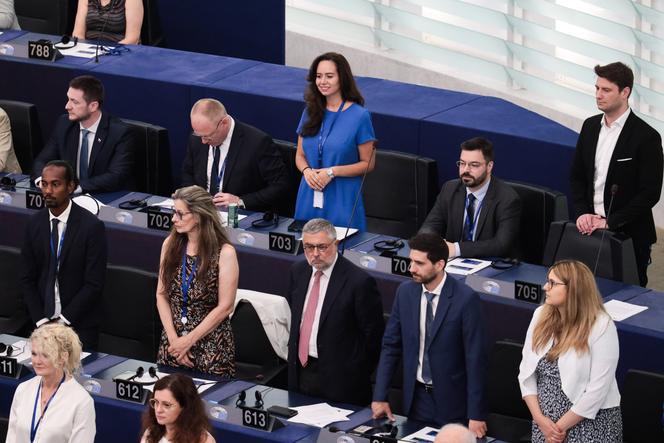


Its inaugural session was entirely devoted to internal organizational matters, with the appointment of the members of its new presidential cabinet. But the European Parliament also moved, on Wednesday, July 17, in Strasbourg, to adopt a resolution "on the need for continued EU support for Ukraine," intended to call attention, right from the start of the new term, to the close rapport between Russia and the many far-right MEPs elected on June 9. A total of 495 MEPs supported the motion, 137 opposed it and 47 abstained.
By criticizing Hungarian Prime Minister Viktor Orban's recent visit to Russian President Vladimir Putin − a trip made in "blatant violation of the EU's treaties and common foreign policy" − the three groups that have formed the majority in the Strasbourg legislature (conservatives, social democrats and liberals) took direct aim at the Patriots for Europe group, chaired by Jordan Bardella, the president of the French Rassemblement National (RN) party. Formed around the RN and Orban's Fidesz, it has become the third-largest group in the new assembly.
In the chamber, Bardella responded to the attacks by defending his Hungarian ally's desire "to keep the channels of discussion open" with Russia. While denouncing "the Russian aggressor," he reiterated the RN's position opposing the entry of Ukraine into NATO and the EU and rejecting the delivery of weapons "that enable direct strikes on Russian territory." This stance differs from Orban's position opposing, as a matter of principle, the delivery of any weapons. The RN voted against the resolution, as did a large majority of the Patriots, although there were a few abstentions.
The Patriots group has, however, been eclipsed in its affinity with Moscow by a new, even more radical far-right group. With just 25 seats, the Europe of Sovereign Nations (ENS) group has united the most zealous Putin fans around the AfD ("Alternative for Germany") party. On Wednesday, with a few abstentions, it voted overwhelmingly against the resolution supporting Ukraine.
René Aust, leader of the AfD in Strasbourg and co-president of this new group, confirmed his geopolitical inclinations in his first speech to the plenary session, criticizing "arms deliveries and European sanctions" without directing a single word of criticism at the Russian president.
To form its group, the AfD, which has been kept out of the Patriots group by the RN due to statements deemed too radical by several of its representatives, went looking for allies in Central and Eastern Europe among the parties most openly supportive of the Kremlin. In one instance, it managed to lure the three MEPs of the Bulgarian nationalist Renaissance party, which made a name for itself in February by sending several of its MEPs to take part in a conference organized by Putin's United Russia party in Moscow.
You have 55.25% of this article left to read. The rest is for subscribers only.
